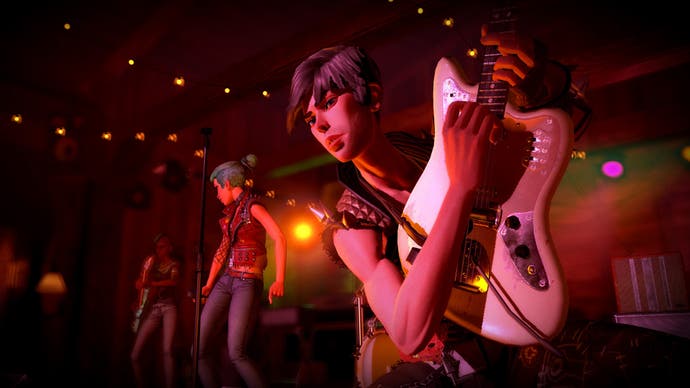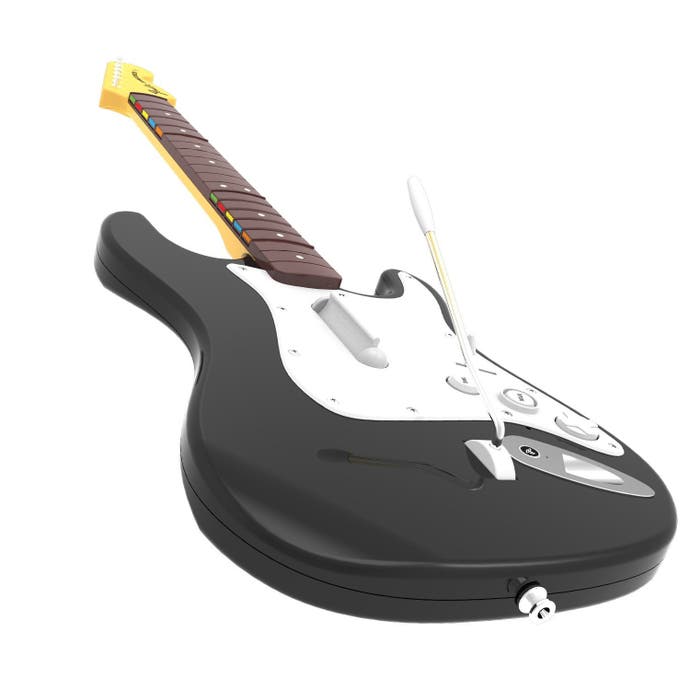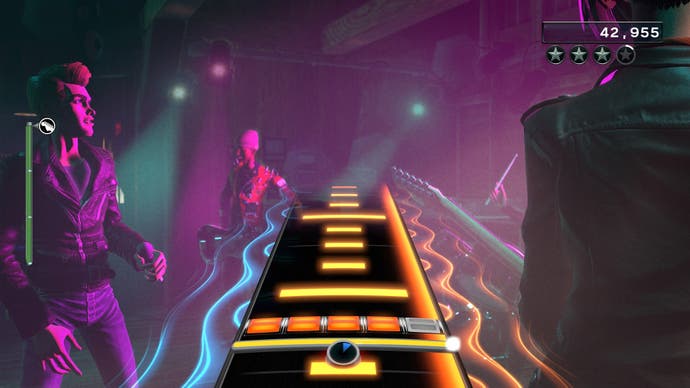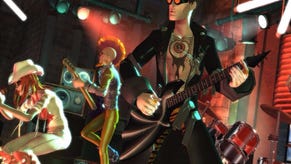Rock Band 4 review
Full plectrum warrior.
Pop stardom isn't a zero sum game, but it is often built on rivalries, real or manufactured. A bit of bad blood can be monetised, whether it's Katy Perry versus Taylor Swift, Blur versus Oasis or the Beatles versus the Stones. In the gladiatorial history of rhythm-action games, it has been Guitar Hero versus Rock Band, two franchises that enjoyed such accelerated success there seemed to be no time at all between them minting a new genre and completely saturating the market. Since 2010, both titles have been lying low - presumably in great mothballs of fire, plotting their returns. This month, they reignite their old rivalry with two carefully stage-managed comebacks.
Guitar Hero Live seems to have veered in a new direction, pre-marketed as a hard reboot that ditches the classic logo, introduces a rejigged controller with double-decker buttons and deploys live-action video to mimic the experience of being sandwiched between Senseless Things and Ned's Atomic Dustbin on a drizzly music festival bill. But first out of the gate is Rock Band 4, produced by genre pioneers Harmonix and peripheral specialist Mad Catz. While it boasts a handful of new feature bullet-points to help tempt lapsed players into shelling out over £200 for the band-in-a-box bundle, Rock Band 4 is more of a thoughtful, streamlined consolidation of the franchise and its impressive legacy than a punky reinvention.
It's also a tangible retreat from the complexity of Rock Band 3, which shipped with two terrifying controllers, one with over 100 individual fret buttons and one which was basically just an electric guitar. That was an audacious attempt to create a generation of actual guitar heroes, shifting the focus from torrid rock fantasy and pushing the game into territory more akin to an Open University home-learning module. For Rock Band 4, the emphasis is firmly back on living out our culturally shared vision of the rock'n'roll dream, and it goes to great lengths to make the social experience as frictionless as possible.

Despite the rock star trappings, there is no velvet rope: the game bends over backwards to remove any barriers to entry. Existing PS3 and Xbox 360 instruments are generally compatible, although the new Fender Stratocaster designed for Rock Band 4 is an enviable piece of kit. Individual players worried about dragging the rest of the band down, down deeper and down through lack of skill, rhythm or both can choose to play on the easiest difficulty setting or even toggle no-fail mode. The assessment of vocal performances leans toward the generous, and the drop-in/drop-out functionality makes it a doddle to vote for setlists or swap instruments.

We're long past the days when individual rhythm games felt like they had a certain personality due to their on-disc song selection, but the 60-plus tracks that ship with Rock Band 4 are a pretty solid selection, with just a whiff of Radio 2. There are a few strong karaoke standouts - notably Brown-Eyed Girl, Suspicious Minds and Uptown Funk - but scattered among the fashionable rock line-up of Arctic Monkeys, Mumford and the Black Keys there are the usual flecks of metal, from the spandex come-ons of Van Halen to the rib-rattling Avenged Sevenfold. There are also two U2 songs, which would perhaps be more of a coup if one of them wasn't from their most recent and generally reviled album.
What's vital is that Rock Band 4 will import a heaving songlist accrued over the lifetime of the series, with all previously owned DLC available to re-download: a bank of over 1500 tracks. Being able to access old content might not sound that sexy, but it's probably the single thing most likely to give Rock Band 4 an edge over the scorched-earth approach of Guitar Hero Live. Inevitably, it does give the game a rather lived-in feel: it feels more like a sleek, spruced-up delivery system than a tantalising new incarnation, but it also serves a loyal fanbase and makes the game even more appealing to newcomers.
The career mode could have injected more of a sense of personality, but it's pretty basic stuff: your band starts small and hits the road, requiring a steady stream of stars to unlock new tours. Rock Band 4 has stuck to the old dressing-up box of Rolling Stone-ready rock clichés, with all the country, metal and hippy costuming you could want for your lanky, rubbery avatars. The career mode follows a branching structure that continually asks you to choose between the pursuit of profit and a less mercantile but more artistically satisfying approach. Neither is shown to be better or worse than the other - possibly since the Harmonix team must have been continually weighing up similar decisions during development. Progressing through the career is as easy or hard as you're willing to make it, which can make it feel a little shapeless. It doesn't help that despite your tour itinerary jetting you around the globe, all the venues - in the early running, at least - are essentially indistinguishable.

What is new is the freestyle solo mode, an attempt to wring even more musical complexity out of the usual five-button beat-matching. During solo segments, a series of colour-coded prompts dictates the speed of your strumming but the actual notes are up to you, with various combinations of fret buttons triggering impressive (albeit pre-baked) fret wizardry. Once the penny drops, it's possible to create genuinely impressive-sounding riffs - further enlivened by a simple yet satisfying way to simulate classic feedback by tilting the guitar - but it feels like a new mechanic to master rather than anything truly groundbreaking. Whole songs can be played in this mode, freeing wannabe Steve Vais from the tyranny of following that rushing highway of coloured lozenges, but it can be a bit of a drag for bandmates who have to buckle down to create a reliable rhythm while the guitarist embarks on a yet another caterwauling fret-run. (If you'd rather not freestyle, there's the option to switch back to authored solos.)
Consolidation might not sound very rock'n'roll, but what Rock Band 4 does, at its best, is work hard to melt away any distance between the player and the music. When you're in full flight on Rush's A Passage To Bangkok, locked into a groove with friends operating as a tight, responsive, giddy unit, it's a powerful reminder of just why rhythm games become so insanely popular so quickly. When everything clicks into focus, it's an exhilarating experience that increases your enjoyment of favourite songs by beaming you inside them. The second coming of Rock Band and Guitar Hero might not be able to achieve the rocketing success of their debuts, but - on this evidence, at least - Rock Band 4 makes it possible to relive past glories while creating equally vivid new ones. It's a remarkable achievement.










